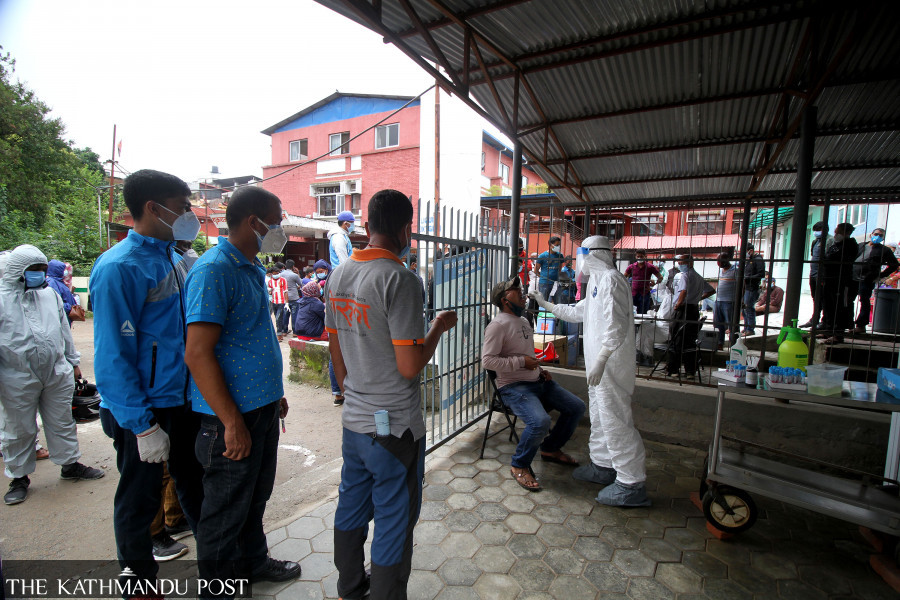Health
Many people are reluctant to undergo Covid-19 tests
Doctors warn a third wave of pandemic could hit the country only in a matter of days, as the authorities are lifting restrictions while the positivity rate is still high.
Arjun Poudel
Covid-19 tests have been halted in Melamchi Municipality and in Helambu Rural Municipality of Sindhupalchok district following June 16 flood and landslides.
Sample collection for polymerase chain reaction tests, which used to be carried out twice a week, has not taken place after roads were destroyed by the disaster caused by monsoon rains.
Health workers deployed in the disaster-hit areas said that they tried to carry out antigen tests in the displaced camps but the survivors refused.
“The displaced families have since left the camp and returned to their areas,” Dr Amir Awal of the Dhulikhel Hospital told the Post over the phone from Melamchi. “They have other pressing priorities like basic needs.”
The people of Melamchi and Helambu are not the only ones reluctant to undergo Covid-19 tests. Officials at the Ministry of Health and Population say many people from across the country are refusing to get tested.
As the positivity rate is still very high, death rate is significant, new cases have been reported from across the country. Meanwhile, preventive measures are being lifted.
Health experts have warned that a third wave of the pandemic could hit the country within a matter of days. They said that priority of basic needs is the main reason for Covid-19 testing reluctance among a large number of people.
“We only enforced restrictions and forced people to stay indoors but never inquired about their problems,” Dr Keshab Deuba, a public health epidemiologist, told the Post . “Why would people cooperate with authorities, when they have more severe problems than the virus?”
A meeting of three chief district officers of Kathmandu Valley on Sunday decided to remove odd-even rules for vehicles in the Valley from Tuesday. The meeting also decided to let microbuses and electric three wheelers (Safa tempo) to operate.
Experts say that authorities have been taking decisions on an ad hoc basis since the beginning of the pandemic.
Even after over 9,200 deaths and over 640,000 infections, the authorities concerned have not learnt any lesson.
“What is concerning is we do not know the infection rate in the community, new cases have been reported from across the country and the number of infections is in thousands of numbers every day,” Dr Achyut Raj Karki, Covid-19 focal person at Bir Hospital, told the Post.
According to Karki, the infection severity is still high and still around 70 percent of beds in the critical care unit, intensive care unit, and high dependency unit of Bir Hospital are occupied by Covid-19 patients.
Despite the high risk of infection outbreak, authorities have lifted almost all restrictions that were enforced to contain the spread of coronavirus.
According to the World Health Organisation, Covid-19 percent-positive rate should be less than five percent for at least two weeks before the government could consider reopening.
On Sunday, 1,042 people tested positive for Covid-19 from among 4,876 polymerase chain reaction tests performed, which means the positivity rate stands at 21.4 percent. Similarly 561 others tested positive in 3,256 antigen tests. In the last 24 hours, 27 people died of Covid-19.
“Risk of spread of infection has not lessened, and I have been urging the authorities not to let their guard down,” Dr Biraj Karmacharya, an epidemiologist, told the Post. “New cases will surge after the removal of restrictions.”
Some experts, however, say that forcing people to stay at their homes for an indefinite period is impossible, because more than the pandemic, it is the lockdown that has affected the people.
“Now we can neither enforce strict restrictions, nor force people to follow safety measures or undergo tests,” Dr Sher Bahadur Pun, chief of Clinical Research unit at Sukraraj Tropical and Infectious Disease Hospital, told the Post. “Authorities could have launched an awareness drive to convince people to change their behaviour but they did not pay much attention.”
Several doctors the Post talked with on Sunday said that a third wave of infection is inevitable and warned that the third wave could be more severe than the first and second waves.
“Vaccine is the only solution for a country like ours, where authorities have failed to make other safety measures effective,” said Deuba, the public health epidemiologist. “Lessening of the loss of the infection depends on how quickly we can immunise our people.”
An official at the Health Ministry said that the Covid-19 situation in Nepal is still out of control.
“Neither could we increase testing, nor could we make contact tracing effective. We also failed to isolate the infected people,” the official told the Post on condition of anonymity. “We even could not set up a quarantine facility after the start of the second wave of infection.”
Health experts say the general public cannot be blamed for the surge in the infection, as they are the ones getting infected, dying and suffering multiple other problems created by the pandemic.
“The risk of the country getting trapped in a vicious cycle of lockdowns and infection surges has increased,” said one health official. “Health facilities will be overwhelmed again and we have to enforce another lockdown. What is concerning is that the lockdown has affected the overall development of the country.”




 11.84°C Kathmandu
11.84°C Kathmandu















